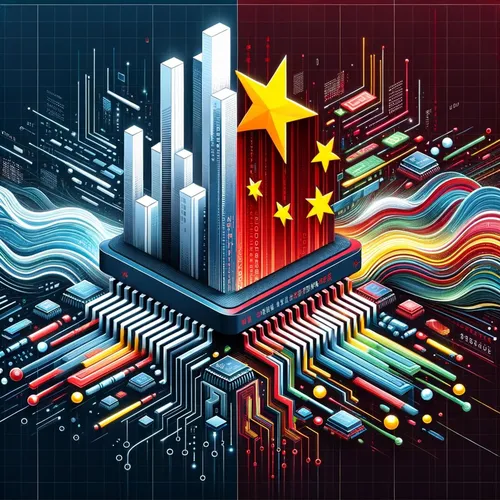Silicon Smackdown: US-China Tech Titans Clash in Epic AI Arms Race
- Author
- Quiet. Please
- Published
- Mon 01 Sep 2025
- Episode Link
- https://www.spreaker.com/episode/silicon-smackdown-us-china-tech-titans-clash-in-epic-ai-arms-race--67584017
This is your Beijing Bytes: US-China Tech War Updates podcast.
Ting here, reporting live from the heart of techno-turbulence: Beijing Bytes, US-China Tech War Updates. Strap in, listeners, because these past two weeks have fired off everything from midnight cyber breaches to policy curveballs. Think of it as Silicon Valley meets Jason Bourne, but throw in a dash of Baidu and a wall of tariffs for flavor.
First to the cyber front—Salt Typhoon. If you haven’t heard that codename, you might want to check your phone bill. FBI cyber chief Cynthia Kaiser revealed Salt Typhoon, a hacking group linked to China’s Ministry of State Security, infiltrated US telecom networks, vacuuming up millions of call records across 80 countries. Imagine your personal texts being archived in an East Beijing bunker—chilling, right? The breach hit not just telecom giants like Verizon and T-Mobile, but also US military networks, with Homeland Security reporting covert access for nearly a year. The impact’s so wide, you’d need an Excel spreadsheet with extra columns just to list the compromised sectors—telecom, finance, energy, even US National Guard data. The FBI is offering a ten-million-dollar bounty—so, listeners, if you know any Salt Typhoon agents, now’s the time to cash in.
Just when defenders thought they could catch their breath, cyber chaos goes global. Last week, the cybersecurity community flagged a supply chain attack in Taiwan using hijacked Sogou Zhuyin IME servers, delivering espionage malware right into government laptops. Even more sci-fi: AI-powered ransomware, “PromptLock,” debuted in late August, unleashing attacks built with large language models. If you’re running critical infrastructure, now is a good time to panic—politely, of course.
Over to policy: the Biden White House axed chip export waivers for Samsung and SK Hynix, the last pipeline for US tech into Chinese fabs. That means a third of global memory chip production in China is now at risk of stalled upgrades. Both Samsung and SK Hynix shares nosedived. American officials call it plugging a “strategic loophole”—Korean execs call it an existential migraine. The move is aimed squarely at slowing China’s push for AI supremacy and advanced semiconductors. And it worked—Nvidia’s China sales of H20 chips evaporated to $0 this quarter, versus $5.5B last. These export curbs are pushing Beijing into DIY mode—witness Alibaba launching its own AI chip and clocking a 26% surge in cloud revenue. Local rivals like Cambricon went from side gig to full hustle, reporting a 4,300% revenue spike. Wall Street is watching the decoupling with popcorn in one hand and spreadsheets in the other.
Tariffs? You bet. Trump’s team extended the Section 301 exclusions for Chinese imports, but the clock’s ticking. Meanwhile, Chinese firms scramble to set up warehouses in America, dodging tariffs and keeping the fast-fashion machine alive. Both sides are playing 4D chess—US pushing Mexico for higher Chinese import duties, China countering with ever-bolder homegrown tech.
The expert consensus: US controls are supercharging China’s innovation, ironically narrowing the gap. Beijing’s “AI Plus” policy is showering R&D cash, and domestic titans are learning to monetize AI and cloud faster than their US counterparts. Everyone’s asking: is it “catch up” or leapfrog? The next move might answer that.
Forecast? Expect more targeted export restrictions, smarter cyber offensives, and an arms race in LLM-powered malware. US tech leads on innovation, but China is catching up, propelled by a billion-user market, relentless hackers, and strategic grit.
Thanks for tuning in—make sure to subscribe so you don’t miss the next byte. This has been a quiet please production, for more check out quiet please dot ai.
For more http://www.quietplease.ai
Get the...
